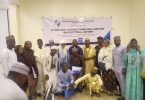
The World Health Organisation, WHO has declared Monkeypox disease as a global health emergency.
WHO Director-General, Dr Tedros Ghebreyesus made this known at a Virtual Press Conference on the report of the 2nd meeting of the International Health Regulation, IHR Emergency Committee meeting on the multi-country outbreak of monkeypox.
The global health body noted that it activated its highest alert level for the growing Monkeypox outbreak, making the virus a Public Health Emergency of International Concern.
Monkeypox, according to the Nigeria Centre for Disease Control, is a rare viral zoonotic infectious disease that is endemic in areas in and near tropical rainforests in Central and West Africa.
It is caused by the Monkeypox virus which belongs to the same Orthopoxviral genus and Poxviridae family of viruses as the Variola virus otherwise known as Smallpox virus.
Dr Tedros Ghebreyesus, noted that the decision came as a result of the rise in cases of the Monkeypox virus.
According to the WHO data, globally, no fewer than 16,000 cases of Monkeypox have been reported across more than 70 countries so far this year, and the number of confirmed infections rose 77 per cent from late June through early July.
Nigeria recorded 101 cases of Monkeypox in 2022, which is the highest figure since 2017 when the disease re-emerged.
The WHO however made some recommendations to include implementation of a coordinated response to stop transmission, to intensify surveillance and public health measures; to strengthen clinical management and infection prevention and control in hospitals and clinics.
Others are to accelerate research into the use of vaccines, therapeutics and other tools; and recommendations on international travel.
The Global body who noted that monkey pox is an outbreak concentrated among men who have sex with men, said it could be stopped if countries work closely with communities of men who have sex with men, to design and deliver effective information and services, and to adopt measures that protect the health, human rights and dignity of affected communities.
RN






